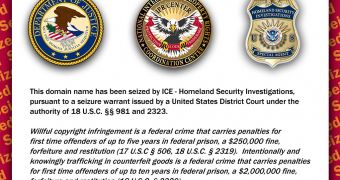The US Immigration and Customs Enforcement seized more than 70 domain names in a move to fight online file-sharing and counterfeiting. Users visiting any of the domains are redirected to a page notifying them that domains have been seized by US authorities.
TorrentFreak, a blog dedicated to all things BitTorrent-related, counted over 70 domains that have been grabbed in one fell swoop. The move is the most aggressive yet and should rise more than a few alarm bells.
First came the news of the seizure of Torrent-Finder.com but it turns out that the site is just one of dozens affected. While there are piracy and counterfeiting laws in effect in the US, with even more controversial ones being discussed, the seizures completely bypass them and are based solely on court orders.
In practical terms, the move did little. While may look good in government reports that over 70 'illegal' sites have been taken down, the sites themselves are alive and well.
While the domain names have been taken over, all of the sites are intact and many have already registered new domain names which don't fall under US jurisdiction, such as .info.
As such, many of them are operating same as before and are spreading the news of the new domain names via Twitter and other means.
But the seizures are not inconsequential, while they've done practically nothing to stop file-sharing or counterfeiting, they show that US groups can censor many websites out there based solely on how much sway they have with the US justice system and authorities.
Considering that they got the Department of Homeland Security's Immigration and Customs Enforcement involved, it's safe to assume that the MPAA, RIAA and the other groups involved do have quite a lot of sway.
The ICE has a pretty self-explanatory name, yet it seems that protecting US' borders somehow involves BitTorrent search engines.
The move underlines an older issue with the way the internet works, one that has been raised times before. The domains were seized from the lowest level possible, directly from the Internet Corporation for Assigned Names and Numbers.
ICANN controls how domain names are assigned and, while there has been pressure to sever its strong ties with the US government, the organization is still, as is apparent, easily influenced by the US authorities.
This latest example of US authorities, directed by private groups like the MPAA and RIAA, exerting control over international affairs should serve as a wakeup call for the rest of the world, but it's unclear if international pressure will solve anything.
What's more, with local copyright groups displaying great power in influencing laws in many western countries, such as the UK, France, Italy and so on, it's unlikely that they will criticize the seizures.

 14 DAY TRIAL //
14 DAY TRIAL //